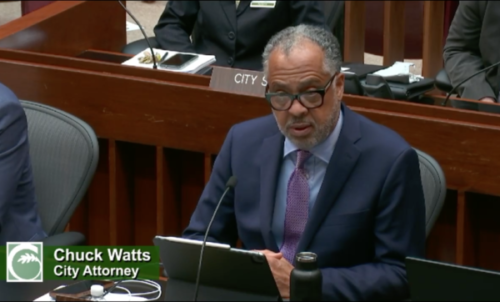The Greensboro City Council plans to spend a lot of time looking at police body worn camera videos.
That is, if City Attorney Chuck Watts can get permission from the courts for councilmembers to view the videos.
At the monthly public forum meeting of the Greensboro City Council on Monday, Aug. 2, as usual most of the speakers talked about the death of Marcus Deon Smith on Sept. 8, 2018. Smith died after being placed in a Ripp Hobble restraint device by Greensboro police officers, what is commonly referred to as being hogtied.
George and Mary Smith, the parents of Marcus Smith, filed a wrongful death lawsuit in federal court against the City of Greensboro, Guilford County, the police officers and the emergency medical technicians involved in the case.
The attorneys representing George and Mary Smith requested the body worn camera videos of 50 other incidents in which the Greensboro Police Department used the Ripp Hobble device. After a court order approving the release have been provided those videos by the City of Greensboro.
At the meeting on Aug. 2, Councilmember Sharon Hightower asked to view the same videos that had been provided to the plaintiffs in the lawsuit.
Watts said, “I don’t think we have the authority to do that.”
Watts explained that the body worn camera videos were provided to the plaintiffs under a federal court order that did not include allowing the defendants (the City of Greensboro) to view them.
Councilmember Michelle Kennedy said that as a party to the lawsuit the City Council should have the right to view any of the evidence presented in the case.
Watts said that Kennedy made a “fair argument” but added that in this case the city would have to follow state law, which states that only a North Carolina Superior Court judge can grant the right to view police body worn camera videos.
Watts added, “I believe we can get access to it.”
Watts said that the city would need to file requests with the courts and it would be up to a judge to decide if the City Council could view the videos.
One question that remained unanswered was whether the city would have to file a separate request for each of the 50 incidents that according to Mayor Nancy Vaughan totaled 227 body worn camera videos or if the city could file one request to see all 227 videos.
Vaughan asked Watts to move forward with the request to view the videos.


These videos are evidence; and for that reason belong in the courts only, not to the City Council – or anyone else.
“I am from the govt, and I’m here to help”.
Smart people, including councilmen, listen to their lawyer. City leaders … listen to your attorney!
What makes the City Council think that they have the ability to access the situation at all must less better than an authority on a case like this. Why would they have the authority to judge anything to be criminal or not. Where did they get their knowledge of and ability to understand conditions and behavior of people on the streets and their situations of human processes. They are NOT an authority of anything of this nature.
This is a “court” action. Why does a select few on the council want to review the tapes prior to court? Would you demand more taxpayer money be paid out to the family in hope of monetary gain or re-election hope prior to the court deciding after hearing all the “evidence”?
Once again our CLOWN anti- police council feel they are better than the justice system.